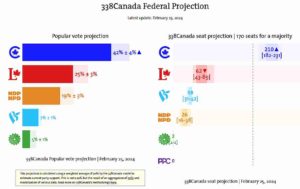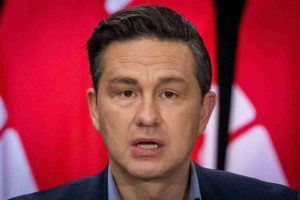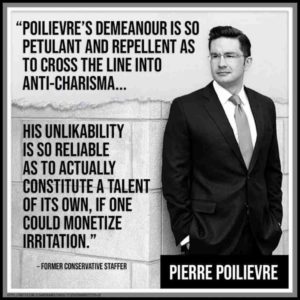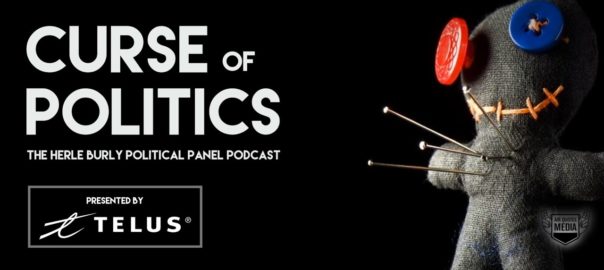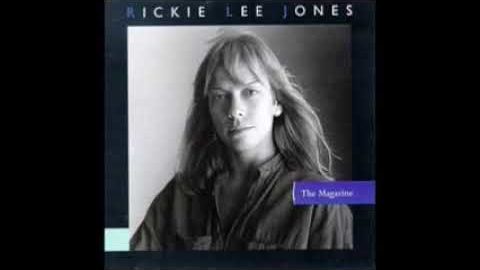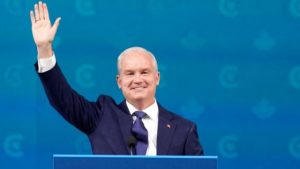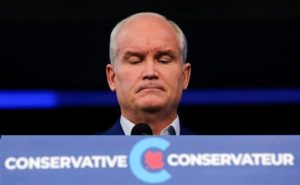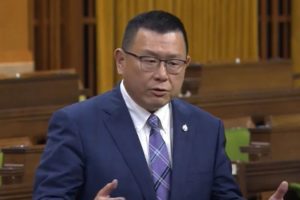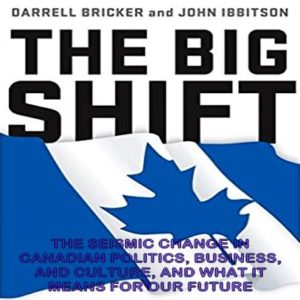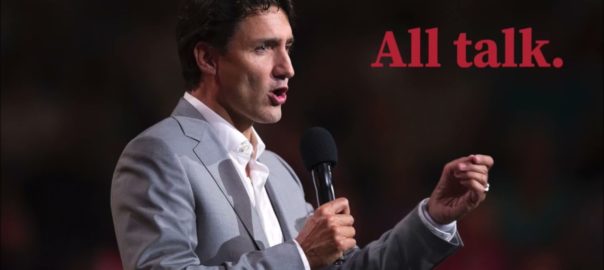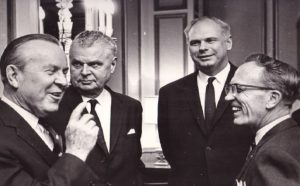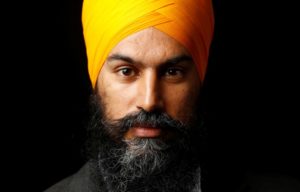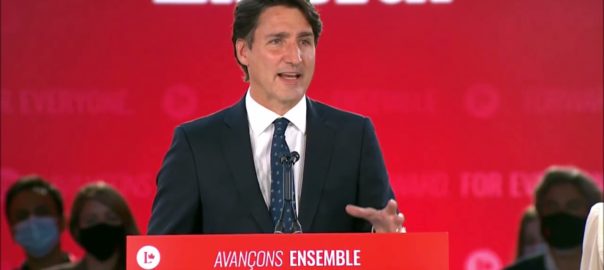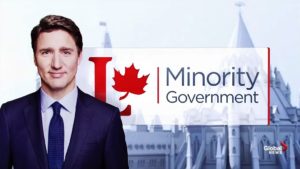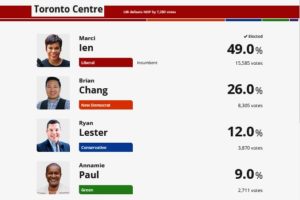
(Left to right) | The Right Honourable Lester B. Pearson, 14th Prime Minister of Canada; the Right Honourable John Diefenbaker, 13th Prime Minister of Canada; Paul Hellyer, Canada’s Minister of National Defence; and the Honourable Tommy Douglas, Leader of the New Democratic Party of Canada from 1961 until 1971. (From: The Shaw Family collection of photographs.). Circa 1962.
On Thursday, August 3rd 1961, Tommy Douglas resigned as Premier of the province of Saskatchewan to become the first leader of the federal New Democratic Party (NDP), a formal alliance between the Co-operative Commonwealth Federation (CCF) and organized labour. As the left’s most eloquent spokesman, Tommy Douglas was able to inspire and motivate both the members of his nascent federal political party and the working women and men he sought to represent in the halls of power in Ottawa, and in Parliament.
Tommy Douglas, as the architect of Canada’s cherished medicare health care system, is considered by many to be a Canadian hero.
From Thursday, June 15th, 1944 — when, as leader of the CCF, he won 47 of 52 seats in the Legislative Assembly of Saskatchewan, forming our nation’s first social democratic government — Tommy Douglas set about to …
- Create the only publicly owned electrical power corporation, providing inexpensive power to all regions of his province;
- Create Canada’s first publicly owned automotive insurance service;
- Create a large number of crown corporations, replacing private sector interests;
- Legislate the unionization of the public service;
- Create a programme to offer taxpayer-funded hospital care to all citizens — the first in North America;
- Introduce medical insurance reform in his first term, gradually moving the province towards universal medicare, which was adopted in Saskatchewan in 1960, and enacted into law by his successor, Woodrow Lloyd in 1962;
- Pass a Saskatchewan Bill of Rights, protecting fundamental freedoms and equality, preceding the adoption of the Universal Declaration of Human Rights by the United Nations by 18 months.
Upon becoming leader of the federal New Democratic Party, Mr. Douglas was congratulated by then Conservative Prime Minister of Canada John Diefenbaker — a fellow, lifelong resident of Saskatchewan — and the Leader of the Opposition, the head of the Liberal Party since January 16, 1958, Lester B. Pearson, a 1957 recipient of the Nobel Peace Prize for his role in resolving the Suez Crisis in 1956.
Over the years, John Diefenbaker had opposed each and and every initiative introduced and passed into law by the CCF government of Tommy Douglas. Tommy Douglas accepted the leadership of the NDP, stating, “What I would wish for one, I would wish for all — and, for me, that means the adoption of a national health care programme for all Canadians” — which is what Mr. Douglas set about to achieve.
Working collaboratively with Lester Pearson, when Mr. Pearson became Canada’s 14th Prime Minister on April 8th, 1963, Tommy Douglas worked closely with the new Prime Minister to bring about a pan-Canadian Medicare system, resulting in 1966 with the passage into law of a publicly-funded and administered, comprehensive, accessible hospital and medical services health insurance plan covering all Canadians, from coast to coast to coast, from that day to this.
Working collaboratively and co-operatively with NDP leader Tommy Douglas, during his tenure as Prime Minister, Mr. Pearson launched not just progressive policies such as universal health care, but as well, the Canada Student Loan Programme, and a universal social programme particularly close to Tommy Douglas’ heart, the Canada Pension Plan, introduced and passed into law in 1965.
There is much to be achieved when progressive parties work closely together, in the spirit of forwarding and promoting the social and economic interests of Canadian women, men and children — working to achieve a just Canada for all.

New Democratic Party leader David Lewis & Liberal Prime Minister Pierre Elliott Trudeau, circa 1972
On Saturday, April 24, 1971 David Lewis became the 2nd leader of the federal New Democratic Party of Canada, following Tommy Douglas’ resignation as NDP leader.
On September 2nd, 1972, Prime Minister Pierre Elliott Trudeau called an election, and on Election Day, October 30, 1972, failed to secure a majority, losing 38 seats in Parliament, requiring the support of David Lewis and the New Democratic Party — which had increased its seat count from 25 to 31 — in order to govern.
David Lewis and Pierre Trudeau sat down in the days and weeks following the 1972 federal election, negotiating the implementation of two programmes that would prove critical to the interests of working people, to Canada’s youth, to families, and for the creative classes across Canada …
1. An affordable housing programme, which became “a made in Canada solution to the provision of affordable housing”, a co-operative housing programme that provided affordable housing to more than 130,000 Canadian families in its first decade, and …
2. A federal jobs programme mainly geared towards youth, a multi-faceted jobs programme geared to serve the interests of a lost generation of seemingly unemployable Canadian youth — which became the Local Initiative Programme (LIP), the Local Employment Assistance Programme (LEAP), and the Youth Employment Programme (YEP) — the three programmes providing billions of dollars in funding for jobs programmes for youth to initiate “entrepreneurial” projects, ranging from the creation of food, farm and wholesale import food co-operatives, child care centres, community-based furniture / automotive / and recycling programmes, as well as the creation of innovative theatre companies across Canada, providing funding to actors and support theatre staff, directors and subsidy funding for the creation of arts centres, such as the Vancouver East Cultural Centre (“The Cultch”).
New Democratic Party leader David Lewis and Prime Minister Pierre Elliott Trudeau worked closely together between 1972 and 1974, when Mr. Trudeau called a federal election on May 8, 1974, re-gaining a majority government two months later, on July 8, 1974, when his government won 32 additional seats. Between October 30, 1972 and May 8, 1974, David Lewis and Mr. Trudeau worked collaboratively and co-operatively together in the interests of the Canadian people, setting aside partisan concerns, developing an enduring respect and admiration for one another — as had been the case with their predecessors, Tommy Douglas and Lester B. Pearson. Although Mr. Lewis was leader of the fourth Opposition Party in Parliament — as is the case with Jagmeet Singh and the NDP today — and while Mr. Lewis held Mr. Trudeau to account in the House of Commons, not once did Mr. Lewis ever allow his criticism of the Liberal government to devolve (as Jagmeet Singh has) into personal attacks full of invective against the Liberal Party leader.
During their terms as leaders of the federal New Democratic Party of Canada, both Tommy Douglas and David Lewis — great Canadian leaders, both — achieved much good for the people of Canada, as they set aside corrosive, soul destroying and ruinous partisanship and the damaging and annihilating politics of personal destruction, in favour of co-operation and collaboration to bring about a more just and economically fair Canada that might serve the interests of all Canadians.
And now we come to the NDP ‘attack’ era of Jagmeet Singh, in the year 2021.
Now, let’s take on the points raised in the NDP ad above.
Seniors care. On August 19, 2021, Prime Minister Trudeau made what was called an historic announcement …
“Today we heard a detailed commitment from Justin Trudeau that would lift-up working women and bring PSWs greater economic security with a $25 minimum wage,” said Sharleen Stewart, president of SEIU Healthcare. “Leadership at the federal level directly in support of our healthcare heroes is nothing short of historic for working women in the elder care economy.”
“We cannot allow Canadian seniors to go without dignified care. That is why introducing and passing the Safe Long-Term Care Act is so essential to ensuring higher quality care standards for our most elderly moms and dads,” added Stewart.
In addition, the Trudeau government brought in programmes to support seniors by passing legislation establishing new national standards in seniors care, while also legislating programmes that will act to ensure seniors can remain in their homes longer, with new, universal support programmes. Rather than doing nothing, as the ad above suggests, the Trudeau government enacted legislation that …
- Raised wages for personal support workers, including a guaranteed minimum wage of at least $25 per hour;
- Will train up to 50,000 new personal support workers;
- Doubled the Home Accessibility Tax Credit, which will provide up to an additional $1,500 to help seniors stay in their homes longer by making them more accessible;
- Improved the quality and availability of long-term care home beds;
- Continued to implement strict infection prevention and control measures, including through more provincial and territorial facility inspections for long-term care homes;
- Developed a Safe Long Term Care Act collaboratively with the provinces and home care providers to ensure that seniors are guaranteed the care they deserve, no matter where they live.
Meanwhile, the Prime Minister has stated that his government will introduce legislation this next term that will raise the corporate taxes paid by Canada’s “largest and most profitable” financial services firms, raising the corporate income tax rate by three percentage points — from 15 per cent to 18 per cent — on all bank and insurance earnings over $1 billion. Mr. Trudeau has stated repeatedly that his government will not tolerate “sophisticated tax planning or profit-sharing” by companies looking to dodge the new measures, promising the introduction of legislation that would “target anti-avoidance rules” to ensure the companies “pay their fair share.” Working with the provinces, the federal government will set about to strengthen and enhance the powers of the federal Financial Consumer Agency of Canada to protect the financial — and house purchasing — interests of Canadians.
Justin Trudeau has stated that enacting universal, single-payer public pharmacare is not off the table for his government. Prior to introduction of such legislation, in their most recent term of office, the government introduced and passed drug pricing measures, explicitly designed to tamp down Canada’s rising pharmaceutical costs, and expanded the mandate of the independent Patented Medicine Prices Review Board — to “protect consumers by ensuring that the prices of patented medicines are not excessive.” At the explicit instruction of the Trudeau government, the Board has removed the United States as a comparator, instead relying on seven comparator countries, including Germany, France, Italy, the United Kingdom, Sweden and Switzerland, where drug prices are much cheaper.
One is left to wonder, if the three ads the New Democratic Party ran in this most recent election are so misleading, what else are the NDP lying to Canadians about?

As stated previously, Jagmeet Singh and the NDP focused their ads and their ire exclusively on Justin Trudeau and the Liberal Party, without ever making reference to the Conservative Party’s record of homo-and-transphobia, their anti-vaxx rhetoric, their egregious position on rescinding the ban on assault weapons, the Tories’ proposed re-introduction of the Northern Gateway pipeline which, apart from blowing Canada’s climate action goals out of the water, would see tanker traffic carrying raw bitumen from the Alberta oil sands down B.C.’s west coast, not to mention, the Conservatives’ truculent position on women’s reproductive rights!
Meanwhile, by seeming to offer support and succour to Erin O’Toole and the Conservatives in the 2021 election, the New Democratic Party expressed no concern whatsoever on the Tories proposed rescinding of the national child care programme the Trudeau government had negotiated with 8 provinces and territories, or the elimination of the Canada Child Benefit in favour of a tax credit that would benefit only the wealthy. The NDP were also mum on the re-introduction of a ban on conversion therapy covering all LGBTQ2+ Canadians, as an early priority for a Liberal minority government were it to be re-elected.
The NDP spent a record $25.8 million over the course of the past five weeks trying to convince Canadians to vote for them — raising their seat count in Parliament by one. $25.8 million dollars for one additional seat, and achieving a mere 17.7% share of the vote, while Jagmeet Singh blatted on about “When, on September 20th, the NDP form government” … what a ludicrous idea, and how demeaning a message to Canadians, who the NDP clearly thought to be fools, if they believed for one moment that the NDP had a hope in hell of forming government.
On Tuesday, Jagmeet Singh faced questions about his leadership over the party’s one-seat gain, despite being in a much stronger financial position for this campaign than the one in 2019.
Asked by the Toronto Star’s Alex Ballingall if Mr. Singh felt secure in his leadership that produced only one additional seat, the NDP leader projected confidence with a wide smile and unambiguous, “Yes.”
Reporters in a scrum with Jagmeet Singh also noted that the NDP targeted Justin Trudeau with negative attacks throughout the campaign and up until the final day, undermining trust in the Prime Minister. In response, Jagmeet Singh doubled down on his — clearly unproductive and wildly ineffectual — campaign approach, which included calling Mr. Trudeau an “abject failure” and “bad for Canada.”
The New Democratic Party federal leader, Jagmeet Singh, told reporters …
“My words, the NDP attack ads, and what some have called the vicious, personal nature of the NDP campaign towards Mr. Trudeau won’t cause any damage to a future negotiation strategy with the re-elected Prime Minister. Everything I said was true. I’m going to stand behind it 100%,” said Mr. Singh. “But when, or if, I meet with the Prime Minister, let me be clear: I’m going to tell him, ‘You messed up’. Even given my relentless attack on Mr. Trudeau and his Liberal team, I believe that together we can get things done for Canadians.”
Maybe former broadcaster Tamara Stanners has the right idea …
